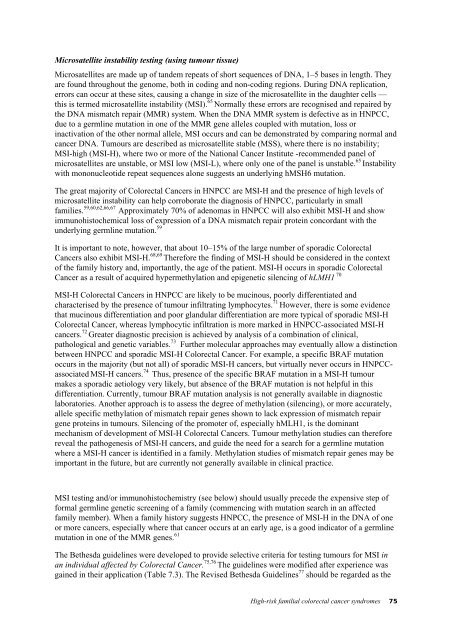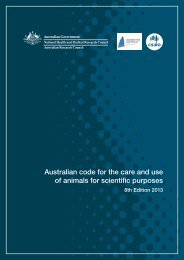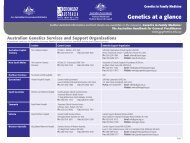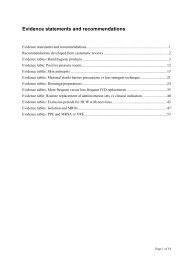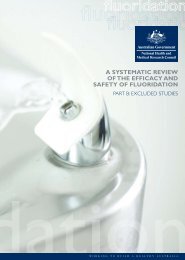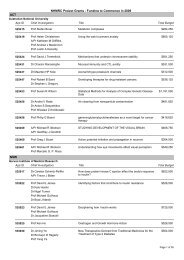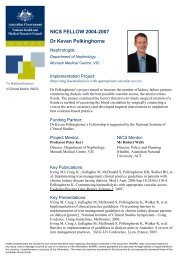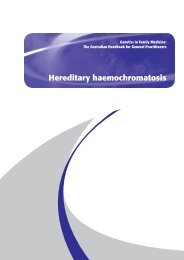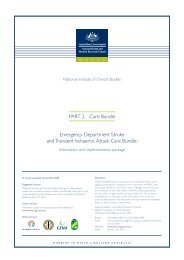Clinical Practice Guidelines - National Health and Medical Research ...
Clinical Practice Guidelines - National Health and Medical Research ...
Clinical Practice Guidelines - National Health and Medical Research ...
Create successful ePaper yourself
Turn your PDF publications into a flip-book with our unique Google optimized e-Paper software.
Microsatellite instability testing (using tumour tissue)<br />
Microsatellites are made up of t<strong>and</strong>em repeats of short sequences of DNA, 1–5 bases in length. They<br />
are found throughout the genome, both in coding <strong>and</strong> non-coding regions. During DNA replication,<br />
errors can occur at these sites, causing a change in size of the microsatellite in the daughter cells —<br />
this is termed microsatellite instability (MSI). 65 Normally these errors are recognised <strong>and</strong> repaired by<br />
the DNA mismatch repair (MMR) system. When the DNA MMR system is defective as in HNPCC,<br />
due to a germline mutation in one of the MMR gene alleles coupled with mutation, loss or<br />
inactivation of the other normal allele, MSI occurs <strong>and</strong> can be demonstrated by comparing normal <strong>and</strong><br />
cancer DNA. Tumours are described as microsatellite stable (MSS), where there is no instability;<br />
MSI-high (MSI-H), where two or more of the <strong>National</strong> Cancer Institute -recommended panel of<br />
microsatellites are unstable, or MSI low (MSI-L), where only one of the panel is unstable. 65 Instability<br />
with mononucleotide repeat sequences alone suggests an underlying hMSH6 mutation.<br />
The great majority of Colorectal Cancers in HNPCC are MSI-H <strong>and</strong> the presence of high levels of<br />
microsatellite instability can help corroborate the diagnosis of HNPCC, particularly in small<br />
families. 59,60,62,66,67 Approximately 70% of adenomas in HNPCC will also exhibit MSI-H <strong>and</strong> show<br />
immunohistochemical loss of expression of a DNA mismatch repair protein concordant with the<br />
underlying germline mutation. 59<br />
It is important to note, however, that about 10–15% of the large number of sporadic Colorectal<br />
Cancers also exhibit MSI-H. 68,69 Therefore the finding of MSI-H should be considered in the context<br />
of the family history <strong>and</strong>, importantly, the age of the patient. MSI-H occurs in sporadic Colorectal<br />
Cancer as a result of acquired hypermethylation <strong>and</strong> epigenetic silencing of hLMH1 70<br />
MSI-H Colorectal Cancers in HNPCC are likely to be mucinous, poorly differentiated <strong>and</strong><br />
characterised by the presence of tumour infiltrating lymphocytes. 71 However, there is some evidence<br />
that mucinous differentiation <strong>and</strong> poor gl<strong>and</strong>ular differentiation are more typical of sporadic MSI-H<br />
Colorectal Cancer, whereas lymphocytic infiltration is more marked in HNPCC-associated MSI-H<br />
cancers. 72 Greater diagnostic precision is achieved by analysis of a combination of clinical,<br />
pathological <strong>and</strong> genetic variables. 73 Further molecular approaches may eventually allow a distinction<br />
between HNPCC <strong>and</strong> sporadic MSI-H Colorectal Cancer. For example, a specific BRAF mutation<br />
occurs in the majority (but not all) of sporadic MSI-H cancers, but virtually never occurs in HNPCCassociated<br />
MSI-H cancers. 74 Thus, presence of the specific BRAF mutation in a MSI-H tumour<br />
makes a sporadic aetiology very likely, but absence of the BRAF mutation is not helpful in this<br />
differentiation. Currently, tumour BRAF mutation analysis is not generally available in diagnostic<br />
laboratories. Another approach is to assess the degree of methylation (silencing), or more accurately,<br />
allele specific methylation of mismatch repair genes shown to lack expression of mismatch repair<br />
gene proteins in tumours. Silencing of the promoter of, especially hMLH1, is the dominant<br />
mechanism of development of MSI-H Colorectal Cancers. Tumour methylation studies can therefore<br />
reveal the pathogenesis of MSI-H cancers, <strong>and</strong> guide the need for a search for a germline mutation<br />
where a MSI-H cancer is identified in a family. Methylation studies of mismatch repair genes may be<br />
important in the future, but are currently not generally available in clinical practice.<br />
MSI testing <strong>and</strong>/or immunohistochemistry (see below) should usually precede the expensive step of<br />
formal germline genetic screening of a family (commencing with mutation search in an affected<br />
family member). When a family history suggests HNPCC, the presence of MSI-H in the DNA of one<br />
or more cancers, especially where that cancer occurs at an early age, is a good indicator of a germline<br />
mutation in one of the MMR genes. 61<br />
The Bethesda guidelines were developed to provide selective criteria for testing tumours for MSI in<br />
an individual affected by Colorectal Cancer. 75,76 The guidelines were modified after experience was<br />
gained in their application (Table 7.3). The Revised Bethesda <strong>Guidelines</strong> 77 should be regarded as the<br />
High-risk familial colorectal cancer syndromes 75


